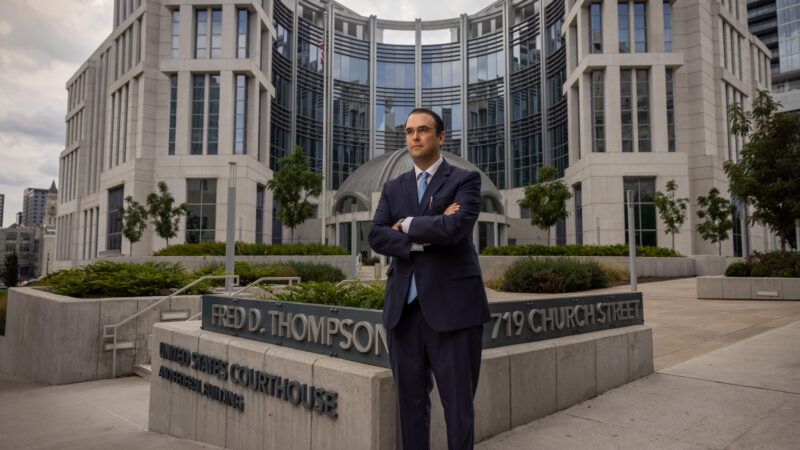Federal Court Scraps Rule That Gagged Tennessee Civil Rights Attorney From Criticizing a Private Prison
For nearly three years, Daniel Horwitz faced contempt of court for talking about a private prison that was one of his most frequent courtroom opponents.

After a nearly three-year legal battle, a Tennessee civil rights attorney will no longer be gagged from criticizing a private prison. The local federal court has scrapped a rule that restricted lawyers from publicly commenting on their cases.
The U.S. District Court for the Middle District of Tennessee amended the court's local rules last week to remove a provision that assumed out-of-court statements by attorneys were prejudicial. The court proposed amending the rule last month following a federal lawsuit filed by the Nashville-area attorney Daniel Horwitz.
In 2022 a federal magistrate judge issued a gag order against Horwitz barring him from making public comments in a wrongful death lawsuit he was pursuing against CoreCivic, a private company that operates the state's Trousdale Turner Correctional Center (TTCC). The judge also ordered Horwitz to delete dozens of past tweets about the company and threatened him with contempt.
Horwitz, represented by the Institute for Justice and the Southeastern Legal Foundation, sued the U.S. District Court for the Middle District of Tennessee and four district court judges last year, arguing that the gag order and rule violated his First Amendment rights and chilled his speech.
"I'm thrilled that my First Amendment rights have been vindicated, but more importantly, I'm thrilled that I can resume informing the public about civil rights abuses across Middle Tennessee," Horwitz said in an Institute for Justice press release.
Horwitz is a prolific civil rights litigator in Tennessee. He has represented, among others, a software company illogically targeted by the state cosmetology board, a woman challenging the rejection of her personalized license plate on First Amendment grounds, and a family who was terrorized by a drunk, off-duty NYPD officer who called them racial slurs and threatened to shoot them.
CoreCivic is one of Horwitz's most frequent courtroom opponents: He had represented plaintiffs in nine separate lawsuits against the company since 2020 when he filed his suit. Horwitz often tweeted about chronic understaffing and wrongful deaths at TTCC. In one tweet he wrote that "the degree of profit-motivated deliberate indifference—which is regularly killing people—is obscene at a level that even I find surprising."
CoreCivic argued, and a federal magistrate judge agreed, that the comments were prejudicial under a local court rule that attorneys "must not make any extrajudicial statements (other than a quotation from or reference to public records) that the lawyer knows or reasonably should know will be disseminated by public communication and will have substantial likelihood of materially prejudicing an adjudicative matter, including especially that will interfere with a fair trial."
That rule also put the burden of proof on the lawyer to show that the extrajudicial comments were not prejudicial.
After more than two years of unsuccessfully trying to challenge the gag order in his various lawsuits against CoreCivic, Horwitz sued the district court and four federal judges, arguing that the rule violated his First Amendment rights.
Horwitz's suit argued that his speech was substantially restricted over two years for fear of sanctions and of having his clients' cases dismissed. For example, when the Department of Justice announced an investigation into conditions at TTCC last year, citing many of the same reports of understaffing and violence that Horwitz relied on in his now-deleted tweets, Horwitz had to turn down news outlets' interview requests.
A U.S. District Court judge dismissed Horwitz's suit last year, finding that he lacked standing to challenge the rule. Horwitz appealed to the U.S. Court of Appeals for the Sixth Circuit.
But last month, while that appeal was pending, the U.S. District Court for the Middle District of Tennessee proposed amending the rule at issue. After public comment, the court ultimately scrapped the restriction altogether; the rule now simply states that attorneys are bound by the Tennessee Rules of Professional Conduct.
The Institute for Justice points out that being able to use social media and press interviews to publicize clients' stories is vital to the work of public interest law firms like itself.
"Discussing cases with the media and public is a huge part of public interest litigation, including the work that we do here," said the institute's president and chief counsel, Scott Bullock, in a press release. "This case showed the importance of being able to talk with the public, because the judges ultimately changed the rule due to public comment."
In a statement to Reason, Ryan Gustin, CoreCivic's senior director of public affairs, said: "We respect the judicial process in which amendments to local rules are reviewed and modified. We also stand by our belief that matters involving litigation, and legal rules, policies and procedures should be decided within the court system and not in the press or social media."
After the gag order was repealed, Horwitz celebrated by making up for lost time.
"CoreCivic's Tennessee prisons are chronically understaffed death factories," he posted on the social media network BlueSky, "and it is outrageous that the [Tennessee Department of Correction] not only has done nothing meaningful to ensure CoreCivic's compliance with minimum contract requirements, but has lobbied to ensure that CoreCivic does not incur meaningful consequences."


Show Comments (4)